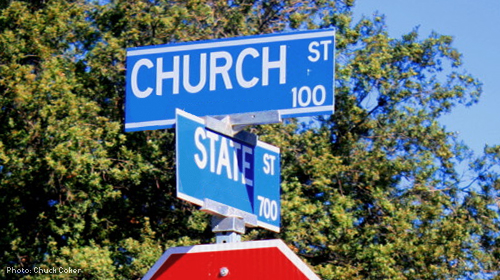
This was to the American Constitution Society blog.
The impact Superstorm Sandy had on homes, businesses, nonprofits, and houses of worship across the Northeast was devastating. And still, in the wake of the storm, these institutions reached out to their communities to provide the help they could. At the same time, they began the process of their own rebuilding; for congregations, this meant repairing their sanctuaries and sacred spaces.
After a disaster, businesses and nonprofits often look to government assistance to help rebuild damaged property. Despite in the past couple of months about how these government assistance programs discriminate against houses of worship, they don't. All nonprofit organizations (including houses of worship) and for-profit businesses can get low-interest, long-term, government-secured loans—up to $2 million—for losses not fully covered by insurance. Direct FEMA grants of taxpayer funds, however, are intended to serve a certain purpose—those grants are for nonprofits with facilities used for emergency, essential, and government-like activities to the community at large. Houses of worship, just like the many other nonprofit facilities, aren't then eligible to receive FEMA grants. Today, the House of Representatives approved H.R. 592, the so-called Federal Disaster Assistance Nonprofit Fairness Act of 2013, a bill that would upend this well-established policy to explicitly permit FEMA to funnel taxpayer funds to houses of worship.
FEMA's policy not only ensures that FEMA grants are used to rebuild facilities that provide the most critical services to the entire community, but also reflects an important constitutional principle. Religious liberty is one of our nation's most fundamental values and it starts from the precept that religion and religious institutions thrive when both religion and government are safeguarded from the undue influences of the other.
As the Supreme Court has repeatedly recognized, one of the central aims of the First Amendment's Establishment Clause is to protect against funding religious worship with taxpayer dollars. Accordingly, longstanding precedent holds that taxpayer funds cannot go to construct or rebuild buildings used primarily for religious activities.
This principle is not discriminatory or hostile to religion. Rather, as James Madison forcefully argued centuries ago, and is equally valid today, it is one of the most fundamental ways we have to protect and defend religious liberty for all. It protects the conscience of each of us, ensuring that no taxpayer is required to fund a religious institution with tenets he or she may not believe in. It likewise protects religious institutions by guaranteeing their autonomy and independence from the government. As the Rev. Mark Lukens of the Bethany Congregational Church in the East Rockaway last week, "When we take money from the government for our houses of worship for purely religious purposes, essentially what we are doing is we are allowing ourselves to be co-opted."
Although houses of worship often serve a central role in the lives of their congregants, the prayer and worship conducted in these sacred buildings are necessarily distinct from the essential, government-like activities conducted in facilities that are eligible for FEMA grants. It would be a dangerous precedent to equate religious worship with the vital services governments provide—one that would harm religious liberty. The First Amendment sometimes requires and sometimes permits houses of worship to be treated differently, and this policy is just another example.
Sadly, this isn't the first time our country has faced natural disaster, and it won't be the last. Houses of worship were damaged by Hurricane Katrina just as they were by Sandy. In the aftermath of Katrina, the Bush Administration—hardly a strict enforcer of the Establishment Clause—nonetheless continued FEMA's longstanding policy on houses of worship. But now, in the wake of Sandy, the House of Representatives has rejected this longstanding policy to explicitly permit FEMA to funnel taxpayer funds to houses of worship.
This effort to erode fundamental protections for religious liberty is disheartening. We must strive to protect and defend the Constitution, even when doing so may be hard and even when we have to rebuild after disasters.
Learn more about the separation of church and state and other civil liberties issues: Sign up for breaking news alerts, , and .

